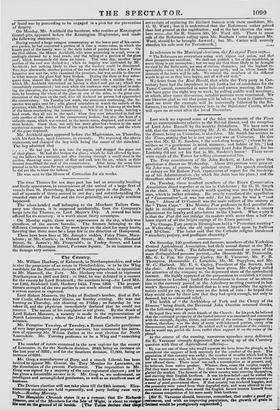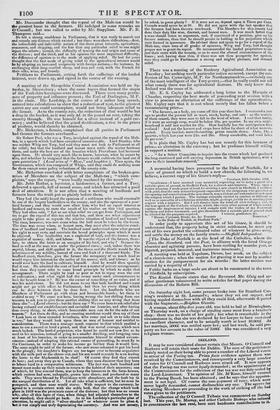On Saturday, 120 gentlemen and farmers, members of the Yorkshire
Central Agricultural Association, had their annual dinner at the Mer- chants' Hall in York. The following are mentioned as some of the more distinguished persons present,—the Honourable W. Duncombe, Mr. G. L. Fox, Sir George Cayley, Sir E. Vavasour, Mr. P. B. Thompson, Honourable C. Langdale, Mr. M. Stapylton, and Mr. W. C. Harland. Mr. E. S. Cayley, President of the Society, took the chair. After the usual toasts had been given, Mr. Cayley called the attention of the company to the depressed state of the agricultural interest. He highly approved of the proposition to establish a Central Association in London ; lauded the resolutions in favour of an altera- tion in the currency passed at the Aylesbury meeting (noticed in last week's Spectator); and declared that as it was impossible the agricul- turists could go on, as they were on the brink of ruin : be hoped that they would show by their acts that they had spirit enough, not only to demand, but to command relief. The health of "the Archbishop of York and the Clergy of the Diocese" being drunk, the Reverend John Overton returned thanks, in the following wise speech.
He hoped they were all strict friends of the Church: for his part, he believed that the continued prosperity of the landed interest was associatedand connected with the strength, dignity, virtue, and comfort of the nation. To support this interest, therefore, was the duty of every well-informed patriot, every wise Government, and all good men. lie wished well to all interests of the country; but lie would say, perish the loom, rather than support it on the ruins of eh*
Plough In the course of the evening, numerous speeches were delivered. Sir E. Vavasour strongly deprecated the mixing up of the Currency question with that of Agricultural suffering_
He was not one of those who would separate the loom from the plough, as he considered the support of both necessary for the comfort of the poor. The population of this country was awful; the number of mouths which had to be fed was enormous ; an i d, n his opinion, the currency was not the cause which now affected them. There never was such a consumption as at present, and, be believed, from native produce. Whence, then, came the surplus supply ? Did they want more mouths? No; there was a branch of the empire Which glutted the market. The farmers of the sister country were starving themselves, and starving their English brethren. It was his firm belief—and he wished the farmers to know it—that the cause was a want of peace in the sister country— a want of good government there. If that country was rendered happier, and the peasantry were raised from their degraded state, and were allowed to con- sume their own produce, then would the English farmer recover himself from the ruinous competition of his more needy Irish brethren.
[Sir E. Vavasour should, however, remember, that under a good go- vernment, and with an improving population, the growth of grain in ibeland would be prodigiously augmented.] Mr. Duncombe thought that the repeal of the Malt-tax would be the greatest boon to the farmers. He indulged in some remarks on O'Connell ; but was called to order by Mr. Stapylton. Mr. P. B. Thompson said—
He felt a strong confidence in Parliament, that it was ready to search out sad remedy any distress which existed ; but there were three difficulties,—first, the indissoluble and indivisible nature of the three great interests, agriculture, commerce, and shipping, and the fear that any particular relief to one might
ittre the others; second, the difficulty of tracing the real origin and cause of the distress ; and the third, and in his opinion the most important difficulty, the difference of opinion as to the mode of applying relief. He had for )ears thought that the best mode of giving relief to the agricultural interest would It by adopting an increased reciprocity with foreign nations,—for instance, by exchanging their long-woolled sheep, and iron and coal, with the French for their silks, wine, and brandy.
Petitions to Parliament, setting forth the sufferings of the landed interest, were drawn up, and signed in the course of the evening.



























 Previous page
Previous page